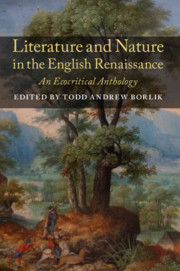Book contents
- Frontmatter
- Contents
- List of Illustrations
- Acknowledgements
- Editorial Principles: Towards the Ecocritical Editing of Renaissance Texts
- Introduction
- PART I Cosmologies
- PART II The Tangled Chain
- PART III Time and Place
- Seasons
- Country Houses
- Gardens
- Pastoral: Pastures, Meadows, Plains, Downs
- Georgic: Fields, Farms
- Forests, Woods, Parks
- Heaths, Moors
- Mountains, Hills, Vales
- Lakes, Rivers, Oceans
- PART IV Interactions
- PART V Environmental Problems in Early Modern England
- PART VI Disaster and Resilience in the Little Ice Age
- Appendix A Industrialization and Environmental Legislation in the Early Anthropocene: A Timeline
- Appendix B Further Reading: A Bibliography of Environmental Scholarship on the English Renaissance
Lakes, Rivers, Oceans
from PART III - Time and Place
Published online by Cambridge University Press: 05 June 2019
- Frontmatter
- Contents
- List of Illustrations
- Acknowledgements
- Editorial Principles: Towards the Ecocritical Editing of Renaissance Texts
- Introduction
- PART I Cosmologies
- PART II The Tangled Chain
- PART III Time and Place
- Seasons
- Country Houses
- Gardens
- Pastoral: Pastures, Meadows, Plains, Downs
- Georgic: Fields, Farms
- Forests, Woods, Parks
- Heaths, Moors
- Mountains, Hills, Vales
- Lakes, Rivers, Oceans
- PART IV Interactions
- PART V Environmental Problems in Early Modern England
- PART VI Disaster and Resilience in the Little Ice Age
- Appendix A Industrialization and Environmental Legislation in the Early Anthropocene: A Timeline
- Appendix B Further Reading: A Bibliography of Environmental Scholarship on the English Renaissance
Summary
It is fitting that England's first Lakeland poet wrote a proem personifying a lake. Brathwaite's relentless anthropomorphising captures the Renaissance tendency to comprehend nature by seeing ourselves reflected in it, while water's fluidity makes it the ultimate shape-shifter.
Source: A Strange Metamorphosis of Man, Transformed into a Wilderness (1634), C8r–D3r.
The Lake is Diana's glass, or common mirror of the rest of Nymphs, wherewith they dress themselves. It is a liquid crystal, whose Ice thereof make the perfect Crystal, while [C8v] the Sands in the bottom as the black of the mirror makes the foil that causeth the reflection. It is more properly a sea than the sea itself, because indeed a true congregation of waters so gathered into the stony cistern of the Rocks. He is no flatterer, but a true tell-troth,° for he will show the Stag his branchy horns, the Ass his prodigious ears, and discover the Satyr to be a beast as he is by his attire. He is very liberal of his liquids to all the Forest, for let them provide meat elsewhere, and he will find them drink enough: [D1r] exceedingly blessed of God for this his hospitality, for though he have given drink to all our Desert ° from the time of Noah, his store is never a whit the less. He is very patient, who will suffer any reasonable burden to be laid on his back and bear it willingly, if it sink not of itself, or be not perhaps stirred up and set on by the malicious blasts of the calumnious winds; for then he will so lash forth with his waves like so many kicks of the heel that twenty-to-one he unhorseth whatsoever is on his back … [D1v] He is not hot, but yet of that quality that he will bear no coals, ° especially if active and lively. As great as he is, there is no Snake shall creep in at a lesser hole than he; and like him where he gets but his head in once, with time enough he will draw his whole body after him.
- Type
- Chapter
- Information
- Literature and Nature in the English RenaissanceAn Ecocritical Anthology, pp. 307 - 326Publisher: Cambridge University PressPrint publication year: 2019



